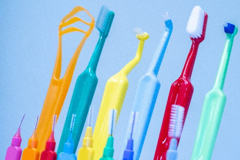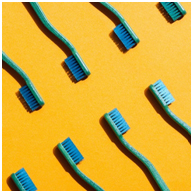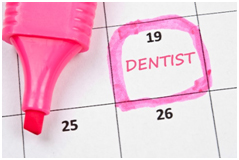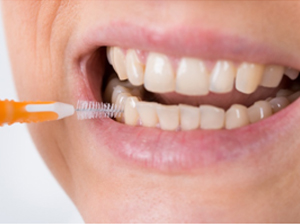Every time you attend for an appointment the dentist or hygienist, they will advise you to include interdental cleaning as part of your oral hygiene routine. But why is interdental cleaning such an important of your oral hygiene routine?
The most important part of tooth care happens at home and in this month’s blog we look at why you should not be avoiding interdental cleaning.
- How do interdental cleaners work?
 Dental plaque builds up throughout the day and hardens on teeth within 24 to 36 hours. However, brushing alone only reaches 60% of the tooth surface. It is necessary to floss or use other interdental cleaning aids to clean those areas that brushing alone misses, preventing plaque from having a chance to harden on teeth.
Dental plaque builds up throughout the day and hardens on teeth within 24 to 36 hours. However, brushing alone only reaches 60% of the tooth surface. It is necessary to floss or use other interdental cleaning aids to clean those areas that brushing alone misses, preventing plaque from having a chance to harden on teeth.
Interdental cleaning helps to prevent tooth decay and can reduce your risk of developing gum disease.
A combination of toothbrushing and interdental cleaning can help to protect against gum disease by removing plaque and food particles, keeping your teeth and gums healthy, while giving you a beautiful smile. Interdental cleaning is essential to your smile’s health, no matter what your age.
- Other health benefits to interdental cleaning
Daily flossing does not just keep your teeth healthy – practicing good oral hygiene contributes to your health in other ways, too. In fact, there is an increasing amount of evidence linking gum disease to an increased risk of heart disease, diabetes, strokes, poor pregnancy outcomes and even dementia. Looking after the health of your gums through a good oral hygiene routine is now more important than ever.
- What should I do if my gums bleed?
 Many people who suffer with sensitive or bleeding gums may be tempted to avoid interdental cleaning for fear of making their bleeding gums worse. But in fact, interdental cleaning can improve the health of your gums, thereby helping to prevent them from bleeding. The fact that your gums are bleeding makes it even more important that you continue with your interdental cleaning.
Many people who suffer with sensitive or bleeding gums may be tempted to avoid interdental cleaning for fear of making their bleeding gums worse. But in fact, interdental cleaning can improve the health of your gums, thereby helping to prevent them from bleeding. The fact that your gums are bleeding makes it even more important that you continue with your interdental cleaning.
- What should I do first?
Brushing may come before flossing in the dictionary, but it should not when it comes to your oral hygiene routine. Interdental cleaning loosens bacteria and food debris from between the teeth, which allows brushing to be much more successful at removing plaque. The fluoride in your toothpaste is also better able to do its job in protecting your teeth if the plaque particles are removed first.
- When should I see a dentist?
 You should attend for your regular routine dental appointments, or sooner if you suspect any problems.
You should attend for your regular routine dental appointments, or sooner if you suspect any problems.
Your dentist can check your teeth and order dental X-rays to help identify any problems. Signs that you need to see a dentist include:
- red, swollen gums
- gums that bleed easily after brushing or flossing
- sensitivity to hot and cold
- persistent bad breath
- loose teeth
- receding gums
- tooth pain
Dental problems like cavities and gum disease are preventable, but the key is sticking with a good dental care routine. This involves regularly using interdental brushes and brushing with a fluoride toothpaste.
If you would like to find out more information on the best interdental cleaning aids to meet your needs. Call Valley Dental Practice today on 01255 220322 and we will endeavour to answer all of your questions.





